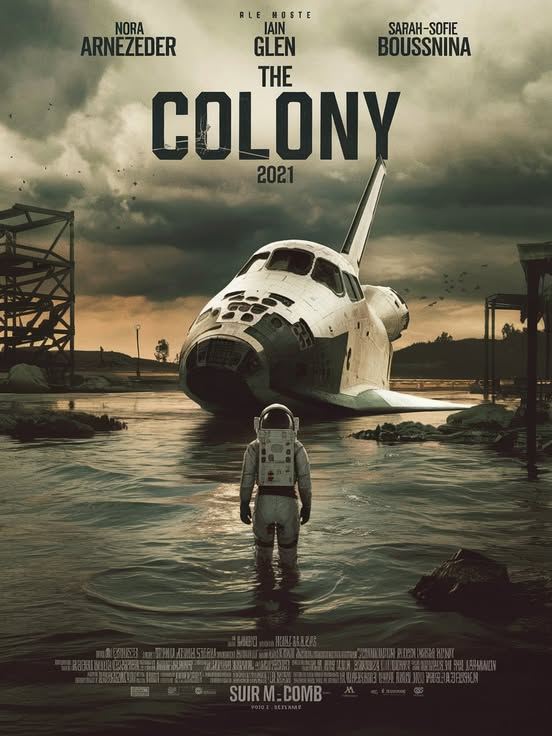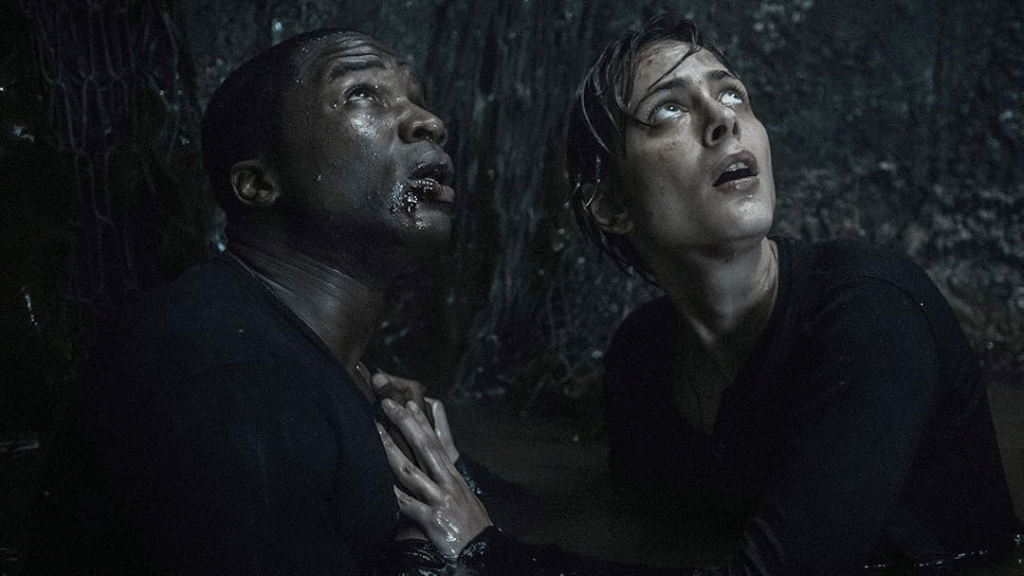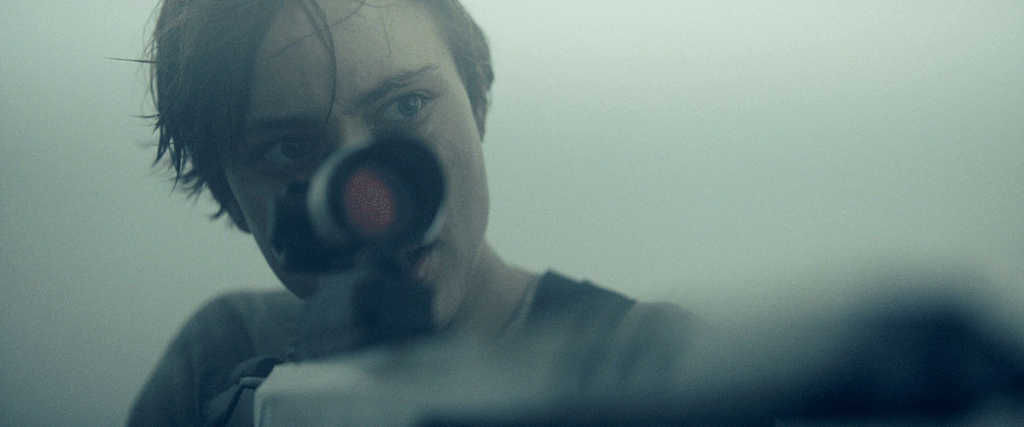The Colony (2021)

Introducing The Colony (2021) – A Journey of Survival in a Post-Apocalyptic Future
The Colony (original title: Tides), released in 2021, is an ambitious science fiction film directed by Tim Fehlbaum (Germany). Featuring a talented cast including Nora Arnezeder, Iain Glen, Sarah-Sofie Boussnina, Sope Dirisu, and Bella Bading, the film is a German-Swiss co-production that delivers a profound story about survival, humanity, and the consequences of human actions on the planet. The Colony is not just an entertaining film but also a cautionary tale about Earth’s future, seamlessly blending action, suspense, and complex ethical questions.
Setting and Plot
The Colony transports viewers to a dystopian future where Earth has become a desolate wasteland following global catastrophes: climate change, nuclear wars, and pandemics have nearly wiped out humanity. The survivors were forced to abandon Earth to seek refuge on Kepler 209, a distant planet. However, on Kepler, humanity faces an even graver issue: infertility caused by the harsh environment, threatening the species’ survival. In a desperate bid for hope, a group of astronauts is sent back to Earth on the Ulysses II mission to determine if the planet can still sustain life and reproduction.

The protagonist, Louise Blake (played by Nora Arnezeder), is a courageous yet conflicted astronaut. After her spacecraft crashes upon landing on Earth, Blake becomes the sole survivor of her team. She discovers a world far different from what she was trained to expect: an Earth shrouded in fog, swamps, and the ruins of a collapsed civilization. Far from being deserted, the planet is inhabited by groups of survivors with their own cultures, languages, and dark secrets about the factions vying for control.
Throughout her journey, Blake encounters characters like Gibson (Iain Glen), a mysterious man with a complex past, and the mother-daughter duo Narvik (Sarah-Sofie Boussnina) and Maila (Bella Bading), who represent hope and familial bonds in a chaotic world. Caught between life-and-death decisions, Blake must navigate questions of loyalty, sacrifice, and the future of humanity. The film poses a critical question: Is humanity worthy of a second chance, and at what cost does survival come?
The plot of The Colony doesn’t just focus on action but delves deeply into themes such as colonialism, class division, and humanity’s responsibility toward the planet. Using the post-apocalyptic setting, the film reflects real-world issues, prompting viewers to contemplate the impact of our actions on Earth today.
Highlights
1. A Haunting Post-Apocalyptic Setting

One of The Colony’s greatest strengths is its visuals, meticulously crafted by cinematographer Markus Förderer. The film presents a vivid dystopian world with a cold, gray-green color palette, waterlogged swamps, and remnants of a forgotten civilization. Wide shots reveal abandoned ships, crumbling structures, and a fog-laden atmosphere, creating a sense of both eerie beauty and claustrophobia. The production design is detailed, from the survivors’ rugged clothing to their primitive tools, immersing viewers in this harsh world.
The setting of The Colony evokes classics like Waterworld or Mad Max but stands out with its unique aesthetic, using light and space to highlight the characters’ isolation and despair. Every frame tells a story, from the flooded landscapes to the rusted ships, contributing to an authentic post-apocalyptic atmosphere.
2. Acting and Character Development

Nora Arnezeder delivers an emotionally charged performance as Louise Blake. She portrays a character who is both strong and decisive yet vulnerable when faced with moral dilemmas. Blake is not just an astronaut on a mission to save humanity but a woman searching for meaning in a world where right and wrong are no longer clear. Her character arc is subtly developed, transitioning from unwavering loyalty to questioning the beliefs she once held.
Iain Glen, as Gibson, brings depth to a mysterious character. His performance blends charm and menace, keeping viewers guessing about his true motives until the final moments. Sarah-Sofie Boussnina and Bella Bading, as Narvik and Maila, create a powerful emotional bond, serving as the heart of the film’s themes of family, sacrifice, and humanity. Supporting characters, such as the Earth’s surviving tribes, though not as deeply explored, play a crucial role in highlighting the complexity of the film’s world.
Some critics note that secondary characters could have been developed further to enhance the story’s cohesion. However, the authentic performances of the main cast compensate for this, making it easy for audiences to connect with their journey.
3. Environmental and Social Messages

The Colony is more than a science fiction film; it’s a stark warning about humanity’s impact on the environment. The film reflects real-world issues like climate change, pollution, and resource depletion while raising questions about our responsibility to future generations. The infertility crisis on Kepler 209 underscores humanity’s fragility when faced with the consequences of its own actions.
Additionally, the film explores social issues like class division and colonialism. The Earth’s survivors are deemed “inferior” by Kepler’s inhabitants, sparking conflicts over power and ethics. The film questions whether humanity can learn from past mistakes or will repeat the cycle of oppression and exploitation.
The role of women in preserving the species is also addressed, though occasionally oversimplified. Nonetheless, the film’s overarching message is compelling, urging viewers to reflect on their actions and their impact on the planet.
4. Technical Aspects and Music
The film’s visual effects and cinematography are impressive, making effective use of a limited budget to create a believable post-apocalyptic world. From perilous tidal surges to intense combat scenes, the effects are seamless and enhance the film’s suspense. Director Tim Fehlbaum skillfully uses natural light and fog to craft an oppressive atmosphere, immersing viewers in the characters’ constant unease.
The soundtrack, composed by Lorenz Dangel, features emotional melodies, ranging from slow, somber tracks to high-energy scores during action sequences. Some viewers note that the music occasionally lacks originality, relying on familiar sci-fi motifs. Nevertheless, it plays a vital role in amplifying the film’s emotional and dramatic moments.
5. Comparison to Other Works
The Colony is often compared to films like Children of Men (2006) for its approach to infertility and human survival, or Waterworld (1995) for its waterlogged, harsh post-apocalyptic setting. However, it carves its own niche by blending sci-fi with social and environmental metaphors. Compared to Mad Max: Fury Road (2015), The Colony focuses less on high-octane action and more on psychological and ethical exploration.
Critical and Audience Reception

The Colony has received mixed reviews from critics and audiences. On Rotten Tomatoes, it’s described as a sci-fi film with unique ideas but occasionally bogged down by a complex plot and lack of innovation. Some critics praise its visuals and environmental message but note that the script can feel disjointed or lack climactic moments. On IMDb, the film scores 5.4/10, with many appreciating its setting and performances, though some find the story predictable or lacking in certain logical details.
Despite this, The Colony is considered a worthwhile watch for fans of dystopian sci-fi, particularly those interested in environmental, social, and ethical themes.
Additional Information
- Runtime: 1 hour 44 minutes
- Rating: R (contains violence, gore, and sensitive themes such as sexual violence and harm to children)
- Release Date: August 26, 2021 (Germany), August 27, 2021 (North America)
- Premiere: 71st Berlin International Film Festival (2021)
- Distributors: Saban Films (North America), Constantin Film (Germany)
- Language: English, with some dialogue in a fictional language used by Earth’s survivors
- Budget: Estimated at around $10 million
- Box Office: Modest theatrical earnings, but the film gained traction on streaming platforms like Fandango at Home, Amazon Prime, and Netflix in select regions.
Target Audience
The Colony is ideal for fans of dystopian sci-fi, particularly those who enjoy films like Children of Men, Waterworld, or The Road. It also appeals to viewers interested in environmental, social, and ethical themes. However, due to its violent scenes, gore, and sensitive topics, the film is not suitable for younger audiences or those sensitive to such content.
Where to Watch

The Colony is available on streaming platforms like Fandango at Home, Amazon Prime Video, and Netflix (depending on the region). You can also purchase or rent it on services like YouTube, Google Play Movies, or iTunes. For the best experience, watch on a large screen with a quality sound system to fully immerse yourself in the film’s post-apocalyptic world.
Conclusion
The Colony (2021) is an ambitious sci-fi film that blends striking visuals, authentic performances, and profound environmental and social messages. While it doesn’t entirely escape the genre’s familiar tropes, it offers a memorable experience through its unique dystopian setting and thought-provoking ethical questions. If you enjoy sci-fi films that combine action, psychology, and humanistic themes, The Colony is a must-watch.
Stream The Colony and share your thoughts on platforms like IMDb, Rotten Tomatoes, or Cinematone. What do you think of the future Earth depicted in the film? Can humanity avoid this fate? Leave a comment and join the discussion!